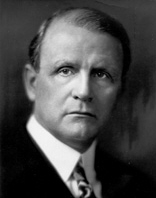Missouri GOP US Senate Barnburner Poised for Closest Primary Finish in 56 Years
Only three of the 35 Republican primaries for the U.S. Senate have been decided by less than 10 points in state history with the average margin of victory at more than 50 points

Businessman John Brunner has surged from a long-shot candidacy last fall to a potential favorite in one of many high profile Republican senate primaries held in the 2012 cycle.
Brunner is matched up against six-term U.S. Representative Todd Akin, former Missouri Treasurer Sarah Steelman and five other lesser-known candidates in what will go down as one of the most competitive Republican U.S. Senate primaries in state history.
A Smart Politics analysis finds that Missouri’s 2012 Republican U.S. Senate primary is slated to be just the fourth out of 36 such contests in state history to be decided by single-digits, with a historical average victory margin of more than 50 points.
Only two Missouri Republicans have ever received a free pass to the general election over the past century.
One-term incumbent Roscoe Peterson ran uncontested in 1934 as did two-term incumbent John Danforth in 1988.
Despite this history, Missouri GOP U.S. Senate primaries have largely been snoozers cycle after cycle, with the average victory margin coming in at 52.3 points.
Republican incumbents have won all 11 primaries in which they have run for reelection by an average of 68.5 points while the 24 primaries without GOP U.S. Senators in the race were decided by an average of 44.9 points.
The margin of victory in Tuesday’s contest, however, is likely to be in the single digits, and low single digits at that.
Only three of the 35 U.S. Senate primaries in party history have been decided by single digits with the most narrowly decided contest occurring during the 1956 cycle.
In that race, Herbert Douglas (40.8 percent) defeated Albert Schoenbeck (38.5 percent) by just 2.3 points with William Thomas a distant third out of four candidates with 14.1 percent of the vote.
Douglas subsequently lost to one-term Democratic incumbent Thomas Hennings by 12.8 points that November.

Patterson would win the general election that fall but then lost by nearly 20 points in his reelection bid to Harry Truman in the 1934 cycle.
Only one other Republican primary in the state has been decided by less than 10 points (R.R. Brewster’s 8.1-point victory in 1922) and only three others have been decided by less than 20 points (in 1920, 1940, and 1958).
The most competitive U.S. Senate primary for the Republican Party since the 1960s was a 35.8-point blow-out by St. Louis County Chief Executive Gene McNary over State Senator David Doctorian in 1980.
The 1928 race mentioned above most closely resembles what is likely to happen on Tuesday.
Brunner, Akin, and Steelman will all easily land in double-digits, with each candidate probably winning north of 20 percent of the vote.
The last time a trio of Republican U.S. Senate primary candidates received even 10 percent of the vote in the Show-Me state was over 50 years ago in 1958 when Hazel Palmer (44.6 percent), perennial candidate William Thomas (26.5 percent), and Homer Cotton (19.6 percent) accomplished that feat.
Palmer went on to get trounced by Democratic incumbent Stuart Symington in the general election.
From the first senate primary in 1914 through 1958 there were nine cycles in which three Missouri Republican candidates received at least 10 percent of the vote (1916, 1920, 1926, 1928, 1940, 1944, 1946, 1956, 1958), one in which four candidates reached double-digits (1932), and another in which five candidates reached that milestone (1922).
Margin of Victory in Missouri Republican U.S. Senate Primaries, 1914-2010
|
Year
|
Winner
|
%
|
2nd Place
|
%
|
MoV
|
|
2010
|
Roy Blunt
|
71.0
|
Chuck Purgason
|
13.1
|
57.9
|
|
2006
|
Jim Talent
|
88.9
|
Scott Babbitt
|
4.1
|
84.8
|
|
2004
|
Kit Bond
|
88.1
|
Mike Steger
|
11.9
|
76.2
|
|
2002
|
Jim Talent
|
89.6
|
Joseph May
|
4.2
|
85.4
|
|
1998
|
Kit Bond
|
86.9
|
Joyce Lea
|
3.9
|
83.0
|
|
1994
|
John Ashcroft
|
83.2
|
Joyce Lea
|
4.9
|
78.3
|
|
1992
|
Kit Bond
|
82.7
|
Wes Hummel
|
17.3
|
65.4
|
|
1988
|
John Danforth
|
100.0
|
(unopposed)
|
0.0
|
100.0
|
|
1986
|
Kit Bond
|
88.9
|
Richard Gimpelson
|
3.9
|
85.0
|
|
1982
|
John Danforth
|
73.9
|
Mel Hancock
|
20.9
|
53.0
|
|
1980
|
Gene McNary
|
61.5
|
David Doctorian
|
25.7
|
35.8
|
|
1976
|
John Danforth
|
93.5
|
Gregory Hansman
|
6.5
|
87.0
|
|
1974
|
Thomas Curtis
|
81.9
|
Paul Robinett
|
10.1
|
71.8
|
|
1970
|
John Danforth
|
72.6
|
Doris Landfather
|
19.7
|
52.9
|
|
1968
|
Thomas Curtis
|
84.5
|
Morris Duncan
|
10.8
|
73.7
|
|
1964
|
Jean Bradshaw
|
78.2
|
Morris Duncan
|
21.8
|
56.4
|
|
1962
|
Crosby Kemper
|
66.6
|
Duane Cox
|
13.2
|
53.4
|
|
1958
|
Hazel Palmer
|
44.6
|
William Thomas
|
26.5
|
18.1
|
|
1956
|
Herbert Douglas
|
40.8
|
Albert Schoenbeck
|
38.5
|
2.3
|
|
1952
|
James Kem
|
84.3
|
William Thomas
|
11.0
|
73.3
|
|
1950
|
Forrest Donnell
|
84.9
|
William Thomas
|
7.4
|
77.5
|
|
1946
|
James Kem
|
54.6
|
William Thomas
|
14.7
|
39.9
|
|
1944
|
Forrest Donnell
|
49.6
|
Howard Stephens
|
21.6
|
28.0
|
|
1940
|
Manvel Davis
|
40.8
|
David Proctor
|
28.6
|
12.2
|
|
1938
|
Henry Caulfield
|
86.0
|
Ray White
|
14.0
|
72.0
|
|
1934
|
Roscoe Patterson
|
100.0
|
(unopposed)
|
0.0
|
100.0
|
|
1932
|
Henry Kiel
|
50.4
|
Dewey Short
|
21.0
|
29.4
|
|
1928
|
Roscoe Patterson
|
31.4
|
Nathan Frank
|
28.0
|
3.4
|
|
1926
|
George Williams
|
56.5
|
David Proctor
|
28.2
|
28.3
|
|
1926 (s)
|
George Williams
|
75.7
|
Blogdett Priest
|
24.3
|
51.4
|
|
1922
|
R.R. Brewster
|
33.4
|
William Sacks
|
25.3
|
8.1
|
|
1920
|
Seldon Spencer
|
49.7
|
Dwight Davis
|
38.2
|
11.5
|
|
1918 (s)
|
Seldon Spencer
|
63.7
|
Jay Torrey
|
36.3
|
27.4
|
|
1916
|
Walter Dickey
|
51.3
|
Thomas Akins
|
29.8
|
21.5
|
|
1914
|
Thomas Akins
|
63.6
|
Politte Elvins
|
36.5
|
27.1
|
|
Average
|
|
70.1
|
|
17.8
|
52.3
|
Table compiled by Smart Politics.
Follow Smart Politics on Twitter.
